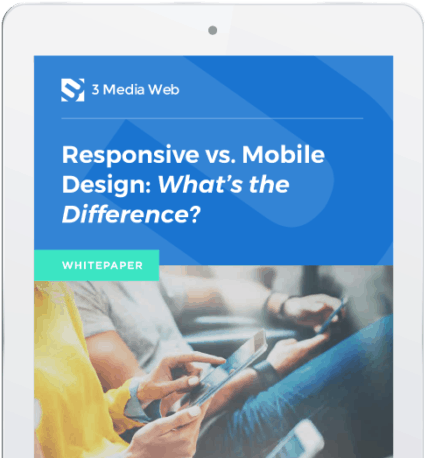There’s been a big shift in how people find lawyers. It used to be through word of mouth and maybe phone directories, but now it’s all about the Internet. Local keyword searches for “lawyer” are really expensive, and since it’s so competitive, your legal website has to shine: You have to make sure your organic SEO, blog posts, social media, and lead gen strategy are all top-notch when designing a legal website.
To top it all off, your website design has to make you stand out. Getting these five design factors right on your law firm website will ensure more people find what they’re looking for — you!
1. Credibility
People in legal trouble need reassurance. And they want someone who’s established and trustworthy, so your legal website needs to project that as much as possible. There are lots of ways a designer can do that, such as through solid, stable fonts or rich textures and colors. Specifics will depend on your firm’s personal tastes and how other firms are presenting themselves in the market.
Another way to establish credibility is through badges. Law association emblems or “best of” award badges are strong visual cues to site visitors that you’re a credible, trustworthy lawyer or firm. Colucci, Colucci, Marcus & Flavin in Boston does a good job of projecting competence and experience through its bold design and use of badges.
Finally, people want to see that you’re confident, caring and forthright. Leading law firms know that site visitors respond to pictures of lawyers who look approachable. That translates to professionally dressed and groomed lawyers in relaxed poses. Avoid photos of people sitting around a table in a board room unless you only do business with C-level executives. The photos at Kademenos, Wisehart, Hines & Lynch Co., L.P.A are a good example of approachable, friendly imagery when designing a legal website.
2. Search Engine Friendliness
While there are challenges to standing out when designing a legal website, they’re not insurmountable. Keep in mind that prospective clients want to find very specific information about their particular issue. That requires lots and lots of keyword-rich content on your site in the form of blog posts, SlideShares, case studies and other web copy, as well as a strong social media presence that highlights your expertise. Prospects aren’t going to reach out to you unless you look like you can help them with their specific case.
Keep in mind that people aren’t necessarily going to search for legal terms. For instance, if someone has had a loved one who’s been involved in an industrial accident, it’s unlikely that they will search for “industrial accident”. They’re more likely to type in specific keywords regarding the accident, such as “backhoe accident at work.”
3. Videos
Use videos to reach out to site visitors and simplify the complex and often scary aspects of the law. Effective videos will put you miles ahead of the competition and, if applicable, can help you show off your courtroom presence, which is a powerful selling point if you have it.
4. Responsiveness
It’s still very common for law firms’ websites to lack responsive design, making it hard for mobile users to find information when they need it most. People don’t like having to pinch or zoom a page to find out information about you. It’s a strike against you if you don’t have a responsive site, and in this fierce business vertical, it can make it almost impossible for your legal website to show up on the first page of the Google results. Colucci, Colucci, Marcus & Flavin PC’s legal website looks great no matter what device you view it on — try it!
If your site isn’t mobile-friendly, it’s outdated. Having an outdated site makes you look like an outdated lawyer. If you haven’t updated your design within the past three years, chances are good that you’re coming across as behind the times. Nobody wants to be represented by a lawyer who’s not completely up to speed.
5. Strong Calls to Action
Prospective clients must reach out to lawyers first, so it’s imperative for a law website to do everything it can to create effective calls to action. When compared to sites in other industries, legal websites may seem like they’re really clamoring for visitors to call, but because it’s considered unethical for lawyers to contact people directly. Good legal sites make it easy for visitors to get in touch. Keep your contact information highly visible on multiple pages on your website, and consider adding a 24/7 live chat feature so potential clients can get answers quickly and easily.

